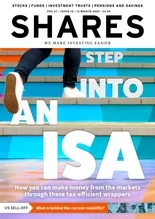
The first-quarter earnings season dominated investor attention on Tuesday, as big UK and European banks followed their US counterparts in releasing results, while more big US technology companies follow Netflix in reporting.
In London, FTSE 100, boosted by a resurgent mining sector on Tuesday, was up 63.30 points, or 0.9%, at 7,443.84 at midday. It had fallen 1.3% on Friday and 1.9% on Monday.
The mid-cap FTSE 250 index was up 170.28 points, or 0.8%, at 20,769.50. The AIM All-Share index traded at 1,033.05, unchanged on Monday's close.
The Cboe UK 100 index was up 0.6% at 740.75. The Cboe 250 was up 0.6% at 18,321.69, and the Cboe Small Companies was 0.1% higher at 15,146.71.
The DAX 40 in Frankfurt was up 1.0% in early afternoon trade, while the CAC 40 in Paris rose 0.9%.
Helping propel the FTSE 100 were share price gains for Glencore, up 3.2%, and Anglo American, up 3.2%. Miners had struggled on Monday, as worries about demand from China intensified amid the threat of widespread Covid-19 lockdowns, including in the capital of Beijing.
Rio Tinto rose 1.3%, despite Barclays cutting the stock to 'underweight' from 'equal weight'.
A strong trading update from Taylor Wimpey lifted the housebuilding sector, while National Express did the same for transport firms.
Taylor Wimpey added 2.9%. It expects house price growth to offset cost pressures. For now, it said, the higher cost of mortgages has not hurt demand.
‘The UK housing market remains healthy, underpinned by continued strong customer demand, low interest rates and good mortgage availability. The recent increase in interest rates, from 0.5% to 0.75%, has not impacted customer appetite and the mortgage market remains competitive, with good availability of low-cost fixed rate mortgage products,’ Taylor Wimpey explained.
National Express added 11%, the best mid-cap performer. The coach and train operator said first quarter revenue ended March 31 equalled its 2019 level, which was prior to the onset of Covid.
Compared to a year ago, the first quarter of 2021, revenue grew 30%. The firm expects 2022 revenue to be in line with 2019.
Reports from HSBC and Associated British Foods were not so well-received.
HSBC fell 3.1% as it reported a slump in profit in the first quarter, but the expected rise in interest rates in coming months gives the bank confidence for future income generation.
In the three months to March 31, the Asia-focused lender recorded $4.17 billion in pretax profit, down 28% from $5.78 billion in the same period the year prior.
Total revenue in the first quarter dropped 4.1% to $12.46 billion from $12.99 billion.
AB Foods slumped 5.2% as it warned that its Primark fashion stores will need to raise prices in order to offset cost inflation. Discount prices are a major differentiator for Primark.
AB Foods said group revenue in the financial first half ended March 5 rose 25% to £7.88 billion from £6.31 billion a year prior.
Pretax profit more than doubled to £635 million from £275 million. Operating profit jumped to £686 million from £320 million.
Chief Executive George Weston said: ‘Primark will implement selective price increases across some of the autumn/winter stock.’
In addition, AB Foods warned margins in its food businesses will be hit.
The FTSE 100 company expects a ‘greater margin reduction’ in foods businesses than previously expected for the full year.
‘We expect recovery in the run-rate of these margins but the full effect of margin recovery is now anticipated in our next financial year,’ the company added.
Back among mid-caps, IWG shares fell 5.2%. The office space provider said system-wide revenue grew 19% to £691.8 million in the first quarter of 2022.
However, it cautioned on headwinds from inflationary pressures. It also plans to monitor the uncertainty in selected key markets, for instance in China, ‘where lockdown restrictions have been reimposed or the return to more normalised market conditions has been slower than previously hoped’.
Commenting on the results, Davy Research said: ‘Trend growth at IWG remains strong with further improvements in occupancy and price through Q1. Higher-than-expected inflation, however, will result in unwelcome downgrades to forecasts. We still view overall trend improvements as strong, and EBITDA should be back around 2019 levels this year.’
Veterinary firm CVS Group added 3.2%. Jefferies lifted the stock to 'buy' from 'hold'.
Sterling had another choppy day, hitting an intraday high of $1.2772, before fading to a low of $1.2705.
Sterling fetched $1.2718 around midday on Tuesday, largely flat from $1.2715 at the time of the London equities close on Monday.
‘Sterling continues to trade on a fragile footing,’ analysts at ING commented.
‘Most now feel that GBP/USD has to test 1.2500, and 1.2850 will now act as strong resistance - should it get that high. Tightening expectations for the 5 May BoE meeting have dropped backed to 29 basis points from 38bp early last week. However, by December, Bank Rate is still priced at 2.17%.’ The key Bank Rate is currently set by the Bank of England at 0.75%.
ING analysts continued: ‘For us, one of the key stories this year will be whether central banks push ahead with tightening even as growth slows. That will clearly deliver flatter or inverted yield curves, but could actually see currencies staying strong. So until the BoE waves the white flag on the rest of its tightening cycle, we think it may be too early to write off sterling - particularly against the euro.’
The euro slipped to $1.0692 on Tuesday afternoon in Europe, from $1.0707 at the European equities close on Monday. Against the yen, the dollar rose to JP¥127.78 from JP¥127.70
Brent oil rose to $102.54 midday Tuesday in London from $100.33 late Monday. Gold stood at $1,904.17, up from $1,898.25.
The economic events calendar on Tuesday has the US advance report on durable goods at 1330 BST.
Focus will continue to be on earning season, with tech stocks taking centre stage. Both Microsoft and Google-owner Alphabet report quarterly earnings after the closing bell in New York on Tuesday.
Ahead of the open, stocks in New York are called lower. The Dow Jones Industrial Average and S&P 500 are each called down 0.3%, and the Nasdaq Composite down 0.4%.
Copyright 2022 Alliance News Limited. All Rights Reserved.




